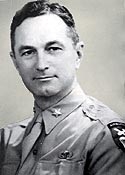William M. Miley
| William Maynadier Miley | |
|---|---|
 |
|
| Nickname(s) | "Bud" |
| Born | December 26, 1897 Fort Mason, California, United States |
| Died | September 24, 1997 (aged 99) Starkville, Mississippi, United States |
| Place of burial | Odd Fellows Cemetery, California, United States |
| Allegiance |
|
| Service/branch |
|
| Years of service | 1918–1955 |
| Rank |
|
| Unit |
|
| Commands held |
501st Parachute Infantry Battalion 503rd Parachute Infantry Regiment 17th Airborne Division 11th Airborne Division |
| Battles/wars |
World War I World War II |
| Awards |
Distinguished Service Medal (2) Silver Star Bronze Star (2) |
| Other work | Professor (Mississippi State University) |
Major General William Maynadier "Bud" Miley (December 26, 1897 – September 24, 1997) was a senior United States Army officer and a professor of military science who fought in both World War I and World War II. During the latter he was one of the early pioneers of airborne warfare and served as Commanding General (CG) of the 17th Airborne Division, leading the division through the Battle of the Bulge and Operation Varsity.
William M. Miley was born at Fort Mason in California, to Sara Miley and Lieutenant Colonel John D. Miley (for whom Fort Miley Military Reservation was named). His family had a long history of military service, with three generations before him serving in the United States Army. Two great-grandfathers, his grandfather, his father, his great-uncle, his uncle and his son all graduated from the United States Military Academy (USMA) at West Point, New York.
Miley himself attended the USMA, where he earned a national intercollegiate championship in gymnastics (in the tumbling, rings, and parallel bars events), and graduated in 1918, the year after the American entry into World War I, whereupon he was commissioned as a second lieutenant into the Infantry Branch of the United States Army. Immediately after graduation he was sent to the Western Front and served with the 1st Division, part of the American Expeditionary Force (AEF) until the end of the war on November 11, 1918.
...
Wikipedia
